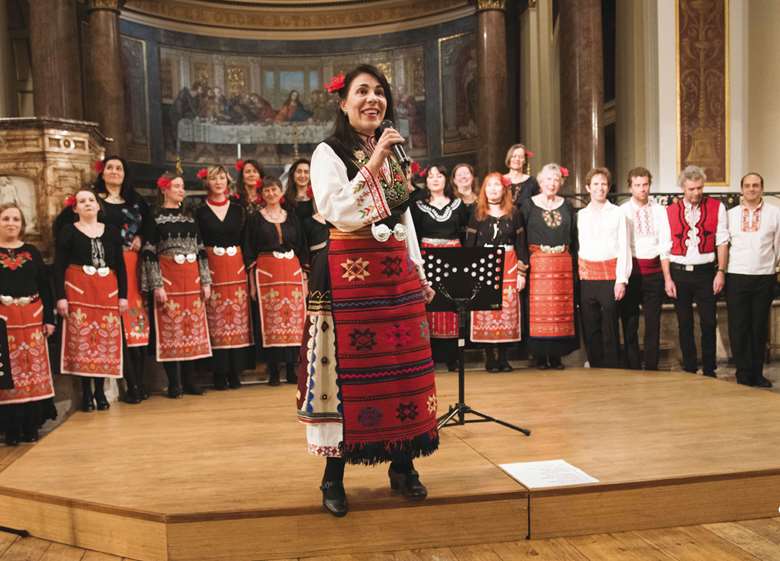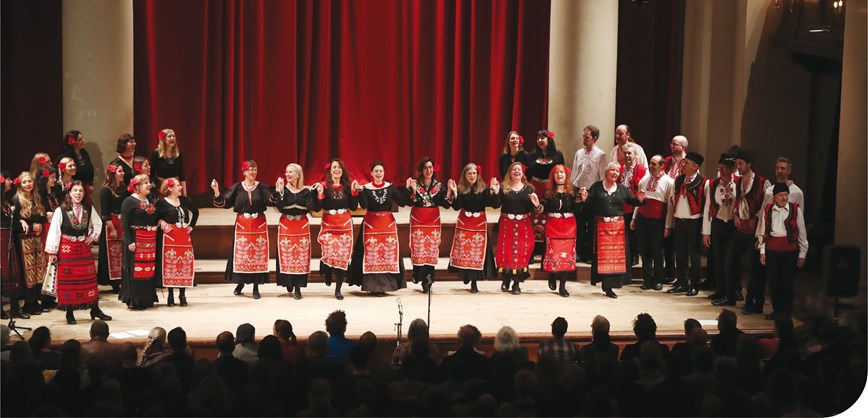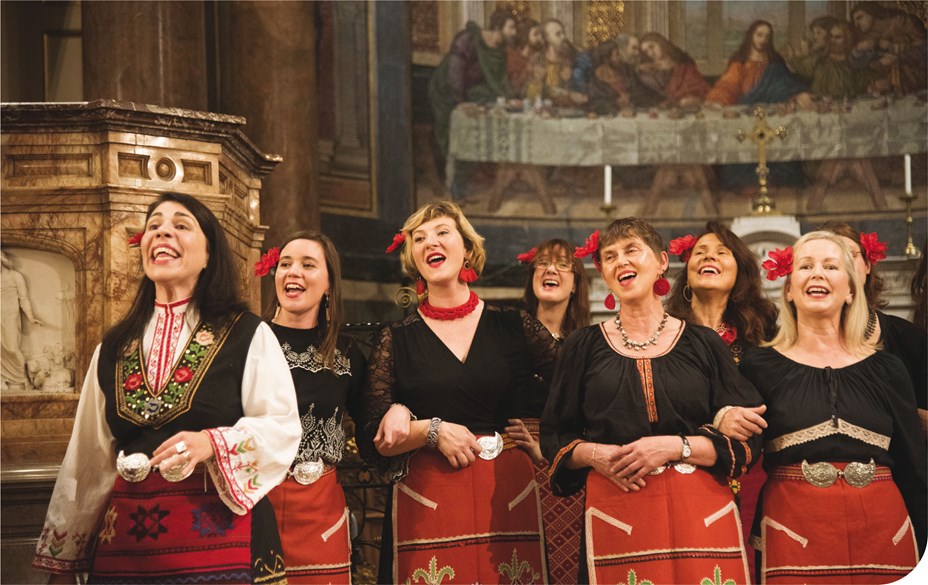From Bulgaria to Bristol: London Bulgarian Choir
Clarissa Payne
Monday, June 1, 2020
Bulgarian folksong combines crunchy harmonies, fascinating timbres – and some unusual vocal techniques, as MT's reporter Clarissa Payne discovers during a recent workshop led by the London Bulgarian Choir.

Denny Vlaeva
‘I think our ancestors were looking for a way to be louder,’ reflects Bulgarian singer Dessislava Stefanova, founder of the London Bulgarian Choir (LBC), an ensemble that specialises in traditional folksong. We are a long way from the Bulgarian mountains – although, meeting in Bristol, we are halfway up a hill. Over a hundred workshop participants had gathered in a church for an introduction to the style and the vocal techniques required in Bulgarian heritage music, before an evening concert performed by Stefanova and her choir.
Bulgarian singers typically marry ‘crunchy’ harmonies – major seconds feature a lot – with a singing technique where the vocal folds are closed while the throat is open; the result is an incredibly rich and varied musical tradition. The otherworldly sound has huge appeal: its most famous exponents are the Bulgarian State Television Female Vocal Choir, whose 1980s Mystère des Voix Bulgares album was a huge hit; the choir toured the world, recorded with megastars – including Kate Bush – and won a Grammy.
Stefanova trained and worked with Filip Koutev, the composer and arranger largely responsible for this revival and update of traditional Bulgarian choral music. Stefanova has a global singing and conducting career, featuring on film soundtracks including Troy and The Virgin Queen, as well as on the soundtrack for the Halo games. She's been leading the London Bulgarian Choir – recently featured on the Missing Cryptoqueen BBC podcast – since founding the ensemble in 2000.
As soon as Stefanova opens her mouth to sing, something special happens in the nave where we're gathered. We've never really heard a voice like this. It's pure yet powerful, full of light but incredibly strong. ‘Prepare to be surprised’, she says, leading us through vocal exercises designed to help us begin to experience the traditional Bulgarian methods of voice production.
We are a mixture of amateur and professional singers – there are dozens of choirs in Bristol covering a wide range of genres – musicians, music teachers and those who were simply curious. Stefanova explains that the use of air is very different from that which we were probably used to. ‘You don't need any more than a natural exhalation’.
First, we simply count up to ten and then backwards to one. Stefanova then asks us to hold the speech sound without changing into singing or trying to push lots of air out. ‘Fiiiiiiiiiiiiive, siiiiiiiiiiiiiiiix’, we chant.
I sing alto, and Stefanova explains that we would probably find it easier to ‘stay in speech’ with our lower range which more closely lines up with the pitch range of normal speech. ‘Sopranos, don't try to force it or go into ‘classical singing technique’ – just move down’, she advises. We switch to cartoon voices: a whiny, ‘it's not fair’, tone, and some Donald Duck-style quacking.

The LBC in concert (Image credit: Justin Palmer)
Was she singing through her nose, asks a participant. ‘No, not at all’, Stefanova answers, demonstrating what singing through the nose actually sounded like. ‘In some of the children's folk choirs, they used to train them with pegs on their noses!’ she says. After being Daleks and droning ‘Exterminate! Exterminate!’ we move on through ‘bagpiping’ – an insistent drone with an ‘aaaaaa’ vowel – to ‘twanging’, the essence of the Bulgarian singing sound. The ‘twang’ is full of harmonics and is the secret of the ‘loudness’ created by Stefanova's ancestors. The most difficult technique is ‘shaking’, which is also the most distinctive and eerily expressive. The sound starts to pulse as the voice hovers on exactly the point where it ‘catches’. At Stefanova's suggestion, we try imitating machine guns.
In the afternoon workshop and evening concert, we heard – and made – sounds that made us laugh, as well as deeply sorrowful songs. The music sometimes needed strict rhythmic discipline and accuracy, but there were also passages of speech-like improvisatory freedom. Stefanova had many intuitive ways of coaxing us towards the ringing brightness of the Bulgarian singing sound. Vibrato was out, as was any indulgent rounding of the sound. ‘Don't be Joanna Lumley!’, she teased us when we started to sound too much like a church choir.
Laughing is an essential part of the choir's rehearsals. Stefanova often walks round the singers making tickly underarm motions to remind them to let go of the abdominal muscles. The opposite of laughing, according to Stefanova, is ‘being toilety’. I remember learning about the ‘Valsalva manoeuvre’ (the closing of the throat when the abdominal muscles push down) and its undesirable effect on playing or singing – ‘being toilety’ is a much snappier description.

(Image credit: Denny Vlaeva)
As a flute player, I've spent 30 years training myself to use my abdominal muscles to support my sound, and to use large amounts of air to produce it. It was a real struggle to switch that off (‘raise your arms and put your head on your knees,’ said Stefanova) and find a totally different way of doing things. The untrained singers in the audience definitely had the advantage. It was a revelation to hear how much Stefanova's voice projects and rings, knowing that she is not using any ‘air support’.
‘Instrumentalists are too attached to a work ethic’, Stefanova told me when I asked about this. While this did endear her to me, the LBC are certainly not lacking in the hard graft department. Most of the members are not Bulgarian. (When asked about this by an audience member, Stefanova said ‘only the most beautiful’ singers were natives, raising smiles from audience and choir alike.) Yet they have committed to an unfamiliar style of music and a radically different way of singing, and are performing and recording at an extremely high level.
During the concert, their intonation never faltered, whether the whole choir was singing in unison four octaves apart or when two soloists held lines with an interval of a major second. As Stefanova put it, often ‘the tune goes around the drone, up and down, looking for a fight’. At the workshop she'd warned us our 58 was slipping into a waltz – there was no danger of that from the LBC, who crisply swapped time signature several times per song.
And they didn't just sing. The performance had acting, choreography, drums and whistles, with everyone looking fantastic all the while in their traditional Bulgarian costumes. The song subjects ranged from the poetic to the daft, with quite a few covering subject matter you might call ‘not safe for work’.
We'd learned a song called Izgreyala in the workshop, and we joined the LBC on stage to sing this with the choir at the evening's end. The lyrics were just made-up babble words – the words come from Turkish, but after asking Turkish friends, Stefanova found they were also nonsense in Turkish. We were simply happy to add our hesitant voices to the huge sound of the choir and try for the final time to put into action the techniques that Stefanova had so expertly introduced to us.
There's a huge appetite for choirs and singing in Bristol and the concert and workshop were both sold out. As I write, a short time later, the strange words and their melodies and harmonies are still ringing around my head, and the driving rhythms are still insistently insinuating themselves.
Find out more about the London Bulgarian Choir at londonbulgarianchoir.co.uk Listen to their soundtrack to the Missing Cryptoqueen podcast via BBC Sounds

